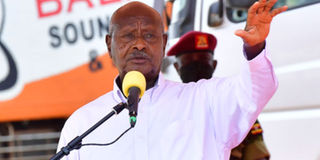Museveni's shot against poverty

President Museveni. PHOTO/PPU
What you need to know:
- The President says it is possible to move the 39 percent of Ugandan households that are in subsistence farming to the money economy if they are empowered with knowledge.
President Museveni at the weekend launched the Parish Development Model (PDM), a highly-anticipated programme, poised to alleviate poverty and help 39 percent of Uganda’s households to join the money economy.
During the launch that took place at Kibuku Primary School in Kibuku on Saturday, Mr Museveni said if well managed, the programme would cut the poverty rate to zero percent.
“We don’t want spectators. We are not here to conserve poverty. We want everybody to be in the field of working so that we eliminate poverty to zero percent,” the President said. Poverty rate is currently at 21 percent, according to the Finance ministry.
The programme launched under the theme “Transformation from subsistence to money economy through increased production for sustainable household income and Livelihood”, has seven pillars, including financial inclusion that will see each of the 10,594 parishes receive Shs17m this financial year, and another Shs100m in the next financial year.
ALSO READ: Inside new govt plan to turn the poor rich
Mr Museveni said it is possible to move the 39 percent of Ugandan households that are in subsistence farming to the money economy if they are empowered with the right knowledge, skills and tailor-made interventions.
The PDM is a multi-sectoral strategy, which aims at increasing production, processing and marketing, and improving infrastructure and service delivery at grassroots level.
The model also tackles community mobilisation and mindset change, parish-based management information system as well as governance and administration.
“We as leaders, need to guide farmers on what to do to get out of poverty. Let people learn to maximise the small pieces of land they have to grow high-value crops such as coffee, fruits, poultry and fishing,” he said.
Mr Museveni said people should stop degrading wetlands but instead engage in planting coffee, citrus fruits, dairy farming, poultry, and fish farming.
“This could be one of the medicines which could help transform the lives of the people by being focused on enterprise selection because I don’t want people to waste time on non-productive enterprises,” the President said.
He also warned the beneficiaries of the programme against misusing the funds.
“The money is a revolving fund. It belongs to Sacco. It’s a grant from the government. We don’t pay back to government but to your Sacco, so that others can borrow,” he said.

President Museveni and Minister of Agriculture, Animal Industry and Fisheries Frank Tumwebaze at the handover of the tractors donated by the Ministry of Agriculture in Kibuku District on February 26, 2022. PHOTOS/YAHUDU KITUNZI
Mr Museveni castigated the district leaders of being behind the collapse of the previous anti-poverty programmes, including National Agriculture Advisory Services (Naads).
Other anti-poverty programmes under the National Resistance Movement government were Entandikwa (1995) poverty eradication action plan (1996), Prosperity For All (2007), among others.
“In this PDM, we have eliminated government workers. In previous programmes, its civil servants were in charge but they were a problem. They are corrupt,” he said.
The President also tasked people to change from the culture of working for the stomach.
Mr Museveni asked religious and political leaders to sensitise locals on the dangers of land fragmentation.
“The religious and politicians must explain to the locals the dangers of land fragmentation. When the head of the family dies, the children need to share but sharing should not be destructive. The family land is like pot when you break it into pieces, it will no longer be useful,” he said.
Prime Minister Robinah Nabbanja warned beneficiaries against misusing the funds.
“Those who think they will steal the funds, they should just forget. We want this programme to succeed,” she said, adding that the beneficiaries should invest in productive ventures such as high-value crops such as onions, cabbage, maize and cotton.
The project
Since the creation of Uganda’s Poverty Eradication Action Plan in 1996, government has come up with series of programmes geared towards uplifting social-economic standards of all Ugandans with an aspiration of acquiring middle-income status.
Under the Parish Development Model, each parish is supposed to get Shs17m in the current financial year, and Shs100m with effect from the next financial year.
The programme will also operationalise parish Savings and Credit Cooperative Societies (Saccos) through which people will be able to obtain financing for selected profitable enterprises.
Twenty-seven Saccos in Butebo District received the PDM money during the launch on Saturday.






